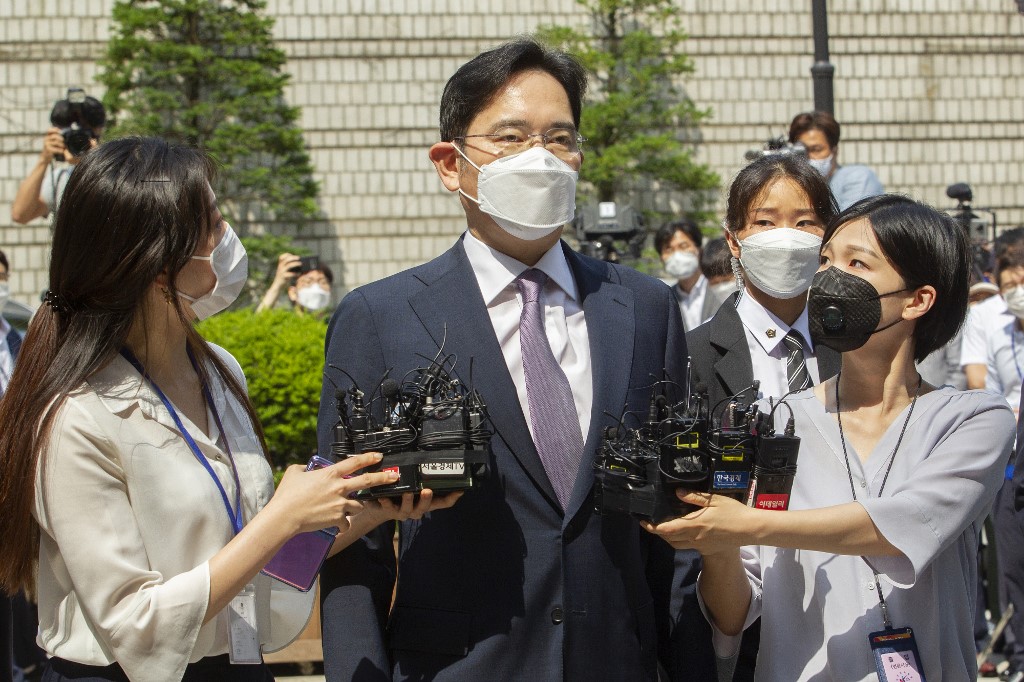(ATF) Shares of Samsung Electronics and its subsidiaries fell at least 4% on Monday (Jan 18) after a South Korean court sent its vice-chairman Jay Y Lee back to prison for bribery, embezzlement and concealment of criminal proceeds.
The verdict is expected to have a big impact on his leadership of the tech giant as Lee will be incarcerated while major decisions are made both on the business and overseeing the inheritance from his father to maintain control of the company.
It will sideline him from the world’s largest smartphone and memory chipmaker just as it looks to overtake rivals in areas such as chip contract manufacturing and artificial intelligence.
It could also have an impact on how people in Korea view big business, analysts said.
Lee, 52, was convicted of bribing an associate of former President Park Geun-hye and jailed for five years in 2017. He denied wrongdoing, and the sentence was reduced and suspended on appeal, which led to him being released after serving a year in custody.
But the Supreme Court sent the case back to the Seoul High Court, which issued Monday’s ruling. It said Lee was guilty of bribery, embezzlement and concealment of criminal proceeds worth about 8.6 billion won ($7.8 million) – the scandal that brought down president Park Geun-hye.
Lee “actively provided bribes and implicitly asked the president to use her power to help his smooth succession” at the head of the sprawling conglomerate, the Seoul Central District Court said in its verdict.
“It is very unfortunate that Samsung, the country’s top company and proud global innovator, is repeatedly involved in crimes whenever there is a change in political power.”
Presiding Judge Jeong Jun-yeong said: “(Lee) has shown willingness for management with newly stronger compliance, as he as vowed to create a transparent company. Despite some shortcomings… I hope that over time, it will be evaluated as a milestone in the history of Korean companies as a start of compliance ethics for a greater leap forward.”
With Lee returning to prison, the year he already served in detention is expected to count toward the sentence – leaving 18 months of his sentence to be served.
De facto head of company
Lee has been the de facto head of Samsung Electronics since his father, Lee Kun-hee, was hospitalised after a heart attack in 2014. The elder Lee died in October, but the chairmanship he held has yet to be filled, and uncertainty cast by his son’s legal troubles was the main reason, analysts said.
Analysts have said day-to-day operations would not be affected, but large-scale decisions whose results are often only visible after years, such as M&As and major personnel changes, may be.
“(Lee’s) absence is not going to disrupt Samsung’s current management… Unlike in his father’s time, Samsung has been managing by system, decision-making distributed to each business’ CEO,” Chung Sun-sup, chief executive of research firm Chaebul.com said.
“But besides the hit to his global image, long-term strategies, like currently unplanned investment for the future and restructuring, may stop,” he added.
Experts say the sentence will create a leadership vacuum that could hamper its decision-making on future large-scale investments.
“It’s really a huge blow and a big crisis for Samsung,” Kim Dae-jong, a business professor at Sejong University told AFP.
Lee has wanted to build the semiconductor business, which now brings in half of Samsung Electronics’ profits. It plans to invest 133 trillion won ($121.5 billion) in non-memory chips through 2030 to become the leader in chip manufacturing, but its 17% market share is a distant second to the Taiwanese giant TSMC which has 54% of the market, according to TrendForce.
Tax concern, separate trial
Samsung has also touted Lee’s deal-making skills in winning a $6.6 billion contract from Verizon last year, describing the network equipment business – small when compared with that of rivals like Huawei – as a key business area.
But Lee – a multi-billionaire – also needs to deal with paying inheritance tax to maintain control of the tech giant. Since his father passed away, an estimated 11 trillion won in inheritance tax is expected to be needed for his family to inherit his listed stockholdings.
And he faces a separate trial over suspected accounting fraud and stock price manipulation connected to a 2015 merger that helped him assume greater control of Samsung Electronics.
Monday’s sentencing can be appealed to the Supreme Court within seven days, the judge said, but legal experts said that because the Supreme Court has already ruled on it once, chances are lower that its legal interpretation will change.
Shares in Samsung Electronics dropped as much as 4% after the ruling, while shares in affiliates such as Samsung C&T, Samsung Life Insurance and Samsung SDI also fell sharply.
With reporting by Reuters
























